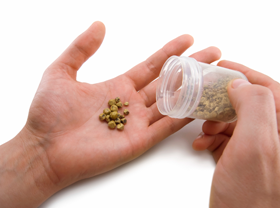 In this study, for the first time we attempted to show that the risk of calcium oxalate stone formation increases with the number of exhibited features of metabolic syndrome in non-stone formers. However, in well-established calcium stone forming subjects, although the risk for calcium oxalate stone formation is higher than non-stone forming subjects, there was no evidence of further increased calcium oxalate stones with increasing features of metabolic syndrome. One potential association between metabolic syndrome and nephrolithiasis is hyperinsulinemia, an invariable feature of the metabolic syndrome. Since hyperinsulinemia and obesity act in opposing directions on renal calcium excretion, so while hyperinsulinemia could potentially increase calcium excretion, this effect can be opposed by high body weight. The results of this study suggest that underlying mechanisms for calcium stone formation may be independent of the abnormalities in insulin metabolism.
In this study, for the first time we attempted to show that the risk of calcium oxalate stone formation increases with the number of exhibited features of metabolic syndrome in non-stone formers. However, in well-established calcium stone forming subjects, although the risk for calcium oxalate stone formation is higher than non-stone forming subjects, there was no evidence of further increased calcium oxalate stones with increasing features of metabolic syndrome. One potential association between metabolic syndrome and nephrolithiasis is hyperinsulinemia, an invariable feature of the metabolic syndrome. Since hyperinsulinemia and obesity act in opposing directions on renal calcium excretion, so while hyperinsulinemia could potentially increase calcium excretion, this effect can be opposed by high body weight. The results of this study suggest that underlying mechanisms for calcium stone formation may be independent of the abnormalities in insulin metabolism.
One limitation of our study was the inclusion of a smaller number of subjects compared with large epidemiologic studies. Future studies examining the role of hyperinsulinemia independent of changes in blood sugar in both non-stone forming and calcium stone-forming subjects are needed to examine the potential role of insulin in urinary calcium excretion. However, the most crucial study to substantiate this link will be conducted over a long-term period with kidney stone incidents as the primary endpoint.
Written by:
Khashayar Sakhaee, MD, et al. as part of Beyond the Abstract on UroToday.com. This initiative offers a method of publishing for the professional urology community. Authors are given an opportunity to expand on the circumstances, limitations etc... of their research by referencing the published abstract.
Metabolic syndrome and the risk of calcium stones - Abstract

More Information about Beyond the Abstract


